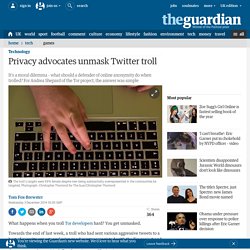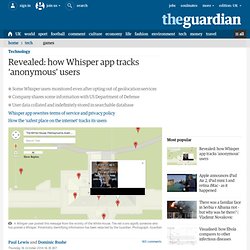

Privacy advocates unmask Twitter troll. What happens when you troll Tor developers hard?

You get unmasked. Towards the end of last week, a troll who had sent various aggressive tweets to a host of security experts and privacy advocates associated with the Tor project and browser, which enables online anonymity, had his identity exposed. To some, that may seem hypocritical. To others, it seems like justice. Andrea Shepard, the Tor developer who uncovered the real identity of her troll, says she was being harassed on and off for a year by a range of tweeters, all believed to be the sockpuppets of one man. Other pro-Tor activists, including Runa Sandvik, Jacob Appelbaum and Jillian York of the EFF were also targeted, according to Shepard’s rundown of the events. Why you can't get strippers' names with public records requests. Nightclubs featuring nude dancing and erotic entertainment.

Government licensing of the club dancers. Open government. Revealed: how Whisper app tracks ‘anonymous’ users. The company behind Whisper, the social media app that promises users anonymity and claims to be the “the safest place on the internet”, is tracking the location of its users, including some who have specifically asked not to be followed.

The practice of monitoring the whereabouts of Whisper users – including those who have expressly opted out of geolocation services – will alarm users, who are encouraged to disclose intimate details about their private and professional lives. Whisper is also sharing information with the US Department of Defense gleaned from smartphones it knows are used from military bases, and developing a version of its app to conform with Chinese censorship laws. Currently, users of Whisper are publishing as many as 2.6m messages a day. Facebook is reportedly developing its own Whisper-style app for anonymous publishing. Miss a Payment? Good Luck Moving That Car. The thermometer showed a 103.5-degree fever, and her 10-year-old’s asthma was flaring up.

Mary Bolender, who lives in Las Vegas, needed to get her daughter to an emergency room, but her 2005 Chrysler van would not start. The cause was not a mechanical problem — it was her lender. Ms. People With Bad Credit Can Buy Cars, But They Are Tracked And Have Remote-Kill Switches. Radical Librarianship: how ninja librarians are ensuring patrons' electronic privacy. It's no secret that libraries are among our most democratic institutions.

Libraries provide access to information and protect patrons' right to explore new ideas, no matter how controversial or subversive. Libraries are where all should be free to satisfy any information need, be it for tax and legal documents, health information, how-to guides, historical documents, children's books, or poetry. And protecting unfettered access to information is important whether that research is done using physical books or online search engines.
But now it has become common knowledge that governments and corporations are tracking our digital lives, and that surveillance means our right to freely research information is in jeopardy. When you know that people are recording what you are doing online or if you know cops, the FBI, the DEA, or ICE could access your library or digital history, chances are you are not going to say or research what you might otherwise. Apple-has-installed-security-backdoors-on-600-million-ios-devices-claims-security-researcher-9620480. The vulnerabilities were uncovered by security expert Jonathan Zdziarski, who presented an academic paper on the subject at a hacker conference in New York last Friday.

Supreme Court to Cops Who Want to Search Your Cellphone: Get a Warrant. On Wednesday, the Supreme Court unanimously ruled that police generally may not search the cellphones of Americans who have been arrested without a search warrant.

(You can read the decision here; it's also posted below.) In a sweeping win for digital privacy rights, the justices recognized that cellphones contain "vast quantities of personal information" and are fundamentally different than other items that a person might have on his or her body when arrested. "Before cellphones, a search of a person was limited by physical realities and generally constituted only a narrow intrusion on privacy. But cellphones can store millions of pages of text, thousands of pictures or hundreds of videos. California Attorney General Releases Mobile Privacy Recommendations. Oregon officials propose per-mile tax for gas sippers. SALEM, Ore.

(AP) - Oregon state officials are proposing an alternative tax for drivers who have bought efficient or electric vehicles that seldom or never stop at the gasoline pump, where government has traditionally collected money to build and fix roads. But the auto-making industry calls the idea of mileage taxes another roadblock for its efficient vehicles, the Salem Statesman Journal reports. In its upcoming session, the Oregon Legislature is expected to consider a bill to require drivers with a vehicle getting at least 55 miles per gallon of gasoline or its equivalent to pay a per-mile tax after 2015.
Because it raises taxes, such legislation would need approval by three-fifths votes in both the House and Senate. The tax would be based on mileage reports that could be made in a variety of ways, such as via smartphone app or global positioning system technology. Lawmakers would have to decide on the rates. Other states, including Washington, have looked at per-mile charges. Police will have 'backdoor' access to health records despite opt-out, says MP. Patients' records at a GP surgery.

According to David Davis, in the past police would need to track down the GP who held a suspect's records and obtain a disclosure order. Photograph: Christopher Thomond for the Guardian The database that will store all of England's health records has a series of "backdoors" that will allow police and government bodies to access people's medical data. David Davis MP, a former shadow home secretary, told the Guardian he has established that police will be able to access the health records of patients when investigating serious crimes even if they had opted out of the new database, which will hold the entire population's medical data in a single repository for the first time from May.
In the past, Davis said, police would need to track down the GP who held a suspect's records and go to court for a disclosure order. Revelations-by-aol-boss-raise-fears-over-privacy. Photo Tim Armstrong, the chief executive of , apologized last weekend for publicly revealing sensitive health care details about two employees to explain why the online media giant had decided to cut benefits.

He even reinstated the benefits after a backlash. But patient and work force experts say the gaffe could have a lasting impact on how comfortable — or discomfited — Americans feel about bosses’ data-mining their personal lives. Mr. Explaining the latest NSA revelations – Q&A with internet privacy experts. When Will our Email Betray Us? An Email Privacy Primer in Light of the Petraeus Saga. The unfolding scandal that led to the resignation of Gen. David Petraeus, the Director of the Central Intelligence Agency, started with some purportedly harassing emails sent from pseudonymous email accounts to Jill Kelley. After the FBI kicked its investigation into high gear, it identified the sender as Paula Broadwell and, ultimately, read massive amounts of private email messages that uncovered an affair between Broadwell and Petraeus (and now, the investigation has expanded to include Gen. IRS claims it can read your e-mail without a warrant.
The Internal Revenue Service doesn't believe it needs a search warrant to read your e-mail. Newly disclosed documents prepared by IRS lawyers say that Americans enjoy "generally no privacy" in their e-mail, Facebook chats, Twitter direct messages, and similar online communications -- meaning that they can be perused without obtaining a search warrant signed by a judge. That places the IRS at odds with a growing sentiment among many judges and legislators who believe that Americans' e-mail messages should be protected from warrantless search and seizure. They say e-mail should be protected by the same Fourth Amendment privacy standards that require search warrants for hard drives in someone's home, or a physical letter in a filing cabinet.
Nathan Wessler, a staff attorney at the ACLU's Speech, Privacy & Technology Project, said in a blog post that the IRS's view of privacy rights violates the Fourth Amendment: Travel - privacy/security. Prosecutors Demand Laptop Password in Violation of Fifth Amendment. San Francisco - The Electronic Frontier Foundation (EFF) urged a federal court in Colorado today to block the government's attempt to force a woman to enter a password into an encrypted laptop, arguing in an amicus brief that it would violate her Fifth Amendment privilege against self-incrimination.
A defendant in this case, Ramona Fricosu, is accused of fraudulent real estate transactions. During the investigation, the government seized an encrypted laptop from the home she shares with her family, and then asked the court to compel Fricosu to type the password into the computer or turn over a decrypted version of her data. But EFF told the court today that the demand is contrary to the Constitution, forcing Fricosu to become a witness against herself.
"Decrypting the data on the laptop can be, in and of itself, a testimonial act -- revealing control over a computer and the files on it," said EFF Senior Staff Attorney Marcia Hofmann. Line Noise: Electronic Device Search and Seizure. Appeals Court Upholds Constitutional Right Against Forced Decryption. San Francisco - A federal appeals court has found a Florida man's constitutional rights were violated when he was imprisoned for refusing to decrypt data on several devices. This is the first time an appellate court has ruled the 5th Amendment protects against forced decryption – a major victory for constitutional rights in the digital age. In this case, titled United States v. Doe, FBI agents seized two laptops and five external hard drives from a man they were investigating but were unable to access encrypted data they believed was stored on the devices via an encryption program called TrueCrypt. Hackers & hacking.
Internet & location privacy/security. Anonymized Phone Location Data Not So Anonymous, Researchers Find. Anonymized mobile phone location data produces a GPS fingerprint that can be easily used to identify a user based on little more than tracking the pings a phone makes to cell towers, a new study shows. Analyzing 15 months of anonymized mobile phone data for about 1.5 million users, researchers at MIT and the Universite Catholique de Louvain in Belgium found that it took very few pieces of data to uniquely identify 95 percent of the users — that is, trace the activity to a specific anonymous individual. Based on hourly updates of a user’s location, tracked by pings from their mobile phone to nearby cell towers as they moved about or made and received calls and text messages, the researchers could identify the individual from just four “data points.”
With just two data points, they could identify about 50 percent of users. “Mobility data is among the most sensitive data currently being collected,” the researchers write in their study, published in Scientific Reports. Surveillance. Jonesing for a Privacy Mandate, Getting a Technology Fix. While the Jones Court held unanimously that the government’s use of a GPS device to track Antoine Jones’ vehicle for 28 days was a Fourth Amendment search, the Justices disagreed on the facts and rationale supporting the holding.
Spies Without Borders Series: Using Domestic Networks to Spy on the World. Much of the U.S. media coverage of the NSA revelations has concentrated on its impact on the constitutional rights of U.S. PRISM - Where do we go from here? In light of the shocking revelations regarding the United States surveillance machine (the National Security Agency) and their PRISM initiative - one has to ask how do we move forward? As you can see from my previous blog post, I have personally written to President Barroso of the European Commission asking that the Commission immediately revoke the Safe Harbour status of the United States, ban all US companies from EU markets until such time as the US Government acknowledge and uphold the fundamental and constitutional rights of European citizens and begin a formal investigation into the allegations that the UK Government's signals analysis agency GCHQ used PRISM to circumvent the legal processes in place governing the acquisition and interception of citizens' communications.
Lavabit, Silent Circle Shut Down: Crypto In Spotlight - Security - Two encrypted email services shut the doors; gag order clouds details of apparent U.S. government interest related to Snowden case. 9 Android Apps To Improve Security, Privacy (click image for larger view) Lock down your privacy. Protect your freedom and privacy; join us in creating an Internet that's safer from surveillance. How Protecting Your Privacy Could Make You the Bad Guy. Access. Extension Gives You More Control Over Your Facebook Privacy. Stealing Your Address Book by Dustin Curtis. Hashing for privacy in social apps. Three days ago, Arun Thampi blogged about his discovery that the Path social networking app uploads the user’s entire iPhone address book to its servers. Next Frontier in Credit Scores: Predicting Personal Behavior. Tracking Voters’ Clicks Online to Try to Sway Them. White House Announces Nominees to Fill Civil Liberties Board. Electronic Frontier Foundation.
Privacy Watchdogs Need Greater Powers, EU’s Justice Chief Says. Data-protection authorities in the European Union must have greater powers to better enforce privacy rules across the 27-nation region, the EU’s justice commissioner said. Why Offline Privacy Values Must Live On In The Digital Age. The FBI can do what?! OVERNIGHT TECH: Wyden: White House-backed cybersecurity bill sacrifices privacy. Law Enforcement Agencies Demanded Cell Phone User Info Far More Than 1.3 Million Times Last Year. 9,000 orders for phone interception a month: Govt. Spy tech secretly embeds itself in phones, monitors and operates them from afar. How a Lone Grad Student Scooped the Government and What It Means for Your Online Privacy. Court Order Seeks Email Data of WikiLeaks Volunteer Jacob Appelbaum.
UPDATE: New York Judge Tries to Silence Twitter in Its Ongoing Battle to Protect User Privacy. Twitter fights government subpoena demanding Occupy Wall Street protester info. One Judge Who Is Leading the Charge Against Secret Orders - Digits. Second judge gives DOJ access to WikiLeaks-related Twitter accounts. Privacy Win: Apple and Dropbox Join Fight to Reform Electronic Privacy Law. UPDATE: Boston Globe reports Twitter subpoena "part of a pending grand jury investigation" “Privacy law – the way ahead?” Part 1 – The New Law of Privacy – Hugh Tomlinson QC. DOJ: Consumers read and understand privacy policies. Well-Meaning "Privacy Bill of Rights" Wouldn't Stop Online Tracking. Privacy...?: Foggy thinking about the Right to Oblivion.
Computer scientist predicts your next Facebook friends. DHS Terrorist Watchlist Service Privacy Impact Assessment. The FBI's Next Generation Identification: Bigger and Faster but Much Worse for Privacy. The Politics of Surveillance: The Erosion of Privacy in Latin America. ITU Approves Deep Packet Inspection Standard Behind Closed Doors, Ignores Huge Privacy Implications. No Warrant, No Problem: How The Government Can Still Get Your Digital Data. Congress, at Last Minute, Drops Requirement to Obtain Warrant to Monitor Email. NSA Lawyer Questioned Over Cellphone Location Tracking of Americans - Digits.
NSA taps in to systems of Google, Facebook, Apple and others, secret files reveal. Revealed: NSA collecting phone records of millions of Americans daily. How the NSA is still harvesting your online data. Why Metadata Matters. Facial-recognition technology needs limits, privacy advocates warn. Judge: Search of suspect's GPS would violate privacy - Baltimore Sun. Vermont Supreme Court Agrees with the ACLU on Electronic Search Limits. I have nothing to hide - or the Sainsbury's Lesson. Electronic Frontier Foundation - Neurosecurity: security and privacy for neural devices; Neurosurgical FOCUS - 27(1):Page E7. Electronic Crime Scene Investigation Handbook (application/pdf Object) Law Enforcement Smartphone Forensics - American Civil Liberties Union.
Police to begin iPhone iris scans amid privacy concerns. UK: Police officers routinely breach Data Protection Act, says civil liberties watchdog - 7/8/2011. MSIT-Privacy - Carnegie Mellon University.